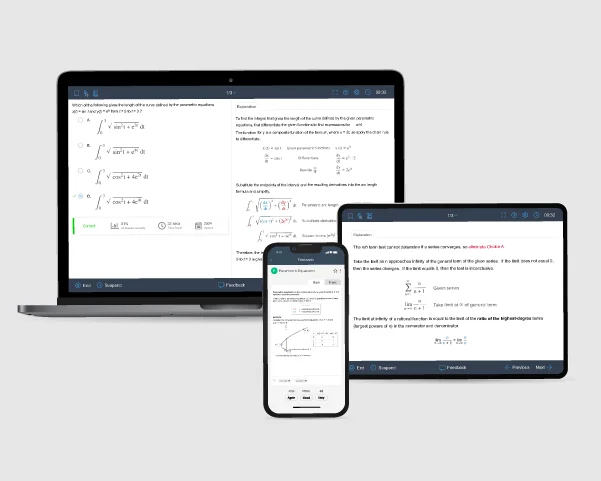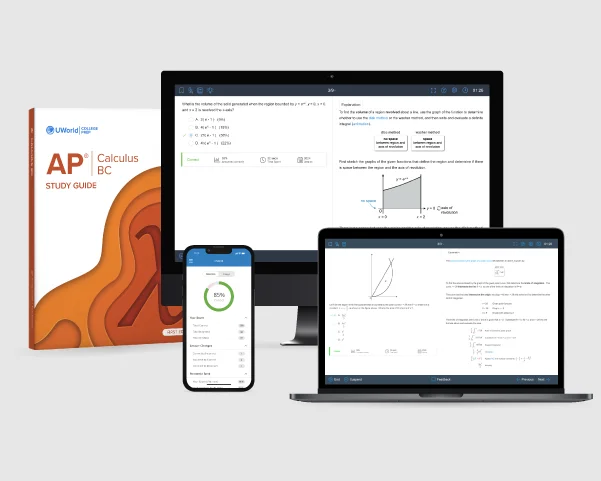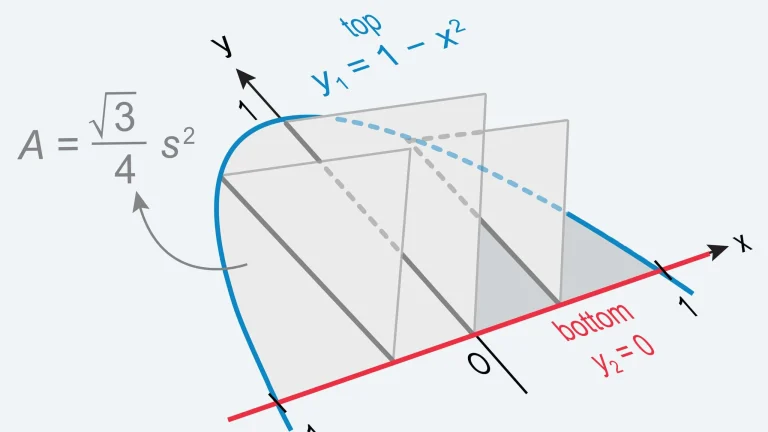The AP Calculus BC exam is an advanced assessment covering topics beyond the AP Calculus AB curriculum, such as series, polar coordinates, and parametric equations. This exam evaluates your ability to apply calculus concepts to solve complex problems. It's designed for students who have mastered AP Calculus AB content and are ready for more challenging material.
What Is AP Calculus BC Equivalent to? Who Can Take It?
The AP Calculus BC course is equivalent to both the first and second-semesters of college calculus, covering the full scope of single-variable calculus. This advanced course is particularly suited for students planning to major in Science, Technology, Engineering, and Mathematics (STEM) fields. Enrolling in Calculus BC can significantly strengthen your mathematical foundation, especially if you’re considering a career in areas such as Engineering or Physics, where math plays a critical role.
If you're looking for a comprehensive resource to prepare for the course and exam, explore our AP Calculus BC Study Guide, available in both print and digital formats. It provides detailed answer explanation to guide you toward exam success.
If you choose to take AP Calculus BC in high school, you will cover a curriculum similar to what is typically taught across two semesters in a college calculus course. The curriculum builds upon that of AP Calculus AB by revisiting fundamental concepts such as Limits and Continuity, Differentiation, Integration, and Differential Equations, while also introducing additional topics such as sequences, series, and polar coordinates, which we will explore in more detail.
The prerequisites for taking AP Calculus BC are the same as for AP Calculus AB. Here’s a quick overview of what you’ll need:
- Algebra I
- Geometry
- Algebra II
- Pre-calculus
This AP course mirrors the material typically introduced in the first semester of a college calculus course and can be quite demanding. However, it could be the perfect fit for you if you have a strong aptitude for solving mathematical problems and mastering complex formulas. While AP Calculus BC is more rigorous than AP Calculus AB, it provides an excellent foundation, potentially allowing you to bypass introductory courses and tackle more advanced subjects in your first year of college.
Below are a couple of questions to help you understand AP Calc BC better:
Is AP Calculus BC the same as college calculus?
Yes! AP Calculus BC covers the content equivalent to a year of college calculus, including Calculus I and Calculus II.
Is Calculus BC equivalent to Calculus 2?
According to the College Board®, Calculus BC is the direct equivalent of Calculus I and II.
Due to its demanding nature, it's recommended that you enroll in AP Calculus BC in either 11th or 12th grade. This timing allows you ample opportunity to master the necessary prerequisites and excel in the course.
What Is on the AP Calculus BC Exam?
The AP Calculus BC exam will test you on two aspects: first, the content taught during the course; and second, the analyzing and problem-solving skills you’ve developed throughout the course.
The course content includes the units taught in the AP Calculus BC curriculum. These units are organized around 3 broad concepts or Big Ideas, as labeled by the College Board. As you progress through each unit, you’ll encounter one or more of these Big Ideas, which form the foundation of calculus.
Before we look into what units are taught, here are the Big Ideas that shape the overarching theme of AP Calculus BC:
- Change
- Limits
- Analysis of Functions
As mentioned earlier, these Big Ideas are distributed across 10 units to help you understand each concept thoroughly. Additionally, the course content is structured similar to many college courses and textbooks. Let's take a look at the 10 units and their relative weight in the AP Calc BC exam:
| Units | Unit Name | Exam Weight | Big Ideas Involved |
|---|---|---|---|
| Unit 1 | Limits and Continuity | 4–7% | Change Limits Analysis of Functions |
| Unit 2 | Differentiation: Definition and Fundamental Properties | 4–7% | Change Limits Analysis of Functions |
| Unit 3 | Differentiation: Composite, Implicit, and Inverse Functions | 4–7% | Analysis of Functions |
| Unit 4 | Contextual Applications of Differentiation | 6–9% | Change Limits |
| Unit 5 | Analytical Applications of Differentiation | 8–11% | Analysis of Functions |
| Unit 6 | Integration and Accumulation of Change | 17–20% | Change Limits Analysis of Functions |
| Unit 7 | Differential Equations | 6–9% | Analysis of Functions |
| Unit 8 | Applications of Integration | 6–9% | Change |
| Unit 9 | Parametric Equations, Polar Coordinates, and Vector-Valued Functions | 11–12% | Change Analysis of Functions |
| Unit 10 | Infinite Sequences and Series | 17–18% | Change |
If you’re curious to learn more about these units and the big ideas mentioned above, check out our guide to the AP Calculus BC course and exam description.
The 10 units listed above are designed to equip you with a set of skills essential for mastering what's covered in introductory collegiate calculus courses. These skills are grouped under 4 mathematical practices by the College Board and are as follows:
- Implementing Mathematical Processes
- Connecting Representations
- Justification
- Communication and Notation
As you prepare for the AP Calculus BC exam, keep in mind that mastering these mathematical practices is just as crucial as understanding the concepts and formulas covered in the course. Regularly revisiting these foundational ideas will strengthen your grasp of the material. After all, a thorough understanding of the fundamentals is key to a solid learning process!
AP Calculus BC Exam Format for 2025
The AP Calculus BC exam consists of 2 sections: multiple-choice (MCQs) and free-response (FRQs). The exam lasts 3 hours and 15 minutes. The exam is hybrid, with MCQs and FRQs viewed in the Bluebook testing app, while the FRQs are handwritten in paper booklets.
The following table gives you a quick overview of the overall exam format:
| Section | Question types | Questions | Time | Exam Weight |
|---|---|---|---|---|
| Section I | Multiple-Choice Questions (MCQs) | 45 | 1 hr 45 mins | 50% |
| Section II | Free-Response Questions (FRQs) | 6 | 1 hr 30 mins | 50% |
Each section is divided into parts A and B, classifying the questions based on calculator usage. Let’s look at what each section looks like.
Section I: Multiple-Choice Questions (MCQs)
In this section, you need to select the correct response from the five answer choices. There is no penalty for incorrect answers. Below are the two parts in this section:
| Part A | 30 MCQs | 60 minutes | Graphing calculator NOT permitted |
| Part B | 15 MCQs | 45 minutes | Graphing calculator permitted |
Section II: Free-Response Questions (FRQs)
This section will assess you based on your analytical problem-solving skills. The free-response section needs you to demonstrate every step of the problem as you deduce the answer. This section follows the ‘step-marking’ method, whereby you’ll be given points based on each step of the problem you approach correctly. This is how the two parts of Section II look like:
| Part A | 2 FRQs | 30 minutes | Graphing calculator permitted |
| Part B | 4 FRQs | 60 minutes | Graphing calculator NOT permitted |
Our guide to the AP Calculus BC exam format is here to help you with in-depth information and sample questions if you’re curious to know what your exam booklet might look like!

Why Take AP Calculus BC?
AP Calculus BC is undeniably challenging and often recommended for students excelling in math who are considering careers in fields, such as Engineering or Physics. While the course requires a strong mathematical background, its benefits are significant: scoring well on the AP Calculus BC exam can grant you access to advanced college courses and set a strong foundation for your academic and career goals.
To succeed, consider enrolling in our AP Calculus BC Online Prep Course, which offers a comprehensive review of topics, interactive problem-solving, and exam-level questions to help you excel.
Preparing for AP Calculus BC requires careful planning and understanding of the material, as the course mirrors the complexity of college-level studies. Here’s why it might be worth the effort:
-
Prepare for College and Save Time
AP Calculus BC, equivalent to college-level calculus and covers more topics than AP Calculus AB. This rigorous course can smooth your transition into college and save time by allowing you to bypass introductory calculus courses, potentially saving money on tuition.
-
Boost Your College Application and Earn Credits
Enrolling in AP Calculus BC strengthens your college application by showcasing your ability to tackle advanced subjects. Many colleges offer credits for AP Calculus BC scores of 3 or higher, depending on their policy.
-
Strengthen Your Transcript
High schools often give extra weight to AP course grades in GPA calculations. Earning a good grade in AP Calculus BC can improve your transcript more than earning an A in a regular course.
-
Get a Thorough Exercise in Calculus
Taking AP Calculus BC deepens your knowledge and prepares you for future studies in fields such as Physics and Statistics. The course also helps develop essential time management and study skills for college.
Research shows that students who score 3 or higher on AP exams typically experience greater academic success in college and have higher graduation rates than their non-AP peers.
Who Should Take AP Calculus BC?
AP Calculus BC might be the perfect course for you if:
-
You have a strong foundation in Math
If you excelled in precalculus, algebra, and trigonometry, you’re likely well-prepared for the challenges of AP Calculus BC. This course demands a solid mathematical background and the willingness to commit fully to its rigorous demands.
-
You want to pursue math-intensive careers
AP Calculus BC is ideal for students considering careers in fields requiring advanced mathematical skills, such as engineering, physics, computer science, or economics. It provides a solid foundation and critical skills for future studies in these disciplines.
-
You excel in high-level math courses
Consistently performing well in other advanced math courses or standardized tests such as the SAT or PSAT/NMSQT is a good indicator that you’re ready for AP Calculus BC. use your score reports and teacher recommendations to gauge whether this course aligns with your strengths and goals.
-
You’re exploring math as a general interest
If you’re undecided about your career path but want to keep your options open, taking AP Calculus BC can broaden your skill set and prepare you for various academic and career opportunities. Alternatively, AP Calculus AB might be a more manageable starting point, allowing you to earn credits while exploring your interest in calculus.
To determine if AP Calculus BC is right for you, consult your teachers, review the College Board’s course materials, and consider advice from upperclassmen who have taken the course. In the next section, we’ll guide you through choosing between AP Calculus BC and AB based on your interests and career objectives.
Should You Take Calculus BC or AB?
While there are subtle differences between AP Calculus BC and AB, the reasons for choosing one over the other vary significantly. Calculus BC includes everything in Calculus AB, plus a couple of additional units, namely units 9 and 10. As a result, it is slightly more rigorous and detailed than AB.
The advantage of choosing Calculus BC over AB is the potential for earning almost double the college credits. Successfully passing the AP Calculus BC exam could grant credit for 2 college calculus courses, which might allow you to skip 2 semesters of coursework and save money on tuition. Additionally, if you take the AP Calculus BC exam, you will also receive a subscore for Calculus AB.
Here’s a quick chart to help you assess whether Calculus BC is a good fit for you:
| Questions to Ask Yourself | Calculus AB or BC |
|---|---|
| Are you taking precalculus? | AB and BC |
| Do you need a more flexible study schedule? | AB |
| Do you excel in math? | BC |
| Are you worried about taking on a fast-paced course? | AB |
| Is your high school course load already heavy? | AB |
| Do you think you can cover more material and complete longer assignments? | BC |
| Are you planning to study humanities or major in a field that doesn’t require a lot of math? | AB |
| Are your future career goals math-heavy? | BC |
Learn about the differences between AP Calc AB and BC if you’re uncertain which is right for you. In conclusion, there are a few more questions that need to be addressed.
Can you take AP Calculus BC without AB?
Yes, you can take the AP Calculus BC exam without taking the AB.
Is AP Calculus BC harder or AB?
AP Calculus BC contains a few more topics and a couple of units more than the AP Calculus AB curriculum. Therefore, it involves more rigor and dedication than AB. So yes, BC is a harder subject to ace compared to AB. It is up to you to decide whether a couple more units would be too much of a challenge.
Can you take AP Calculus without taking precalculus?
Since precalculus prepares the groundwork for you to jump to AP Calculus BC, it is essential to have a precalculus course in high school to make things easier for you to succeed in the AP Calc BC Course.
What Is the Difference Between Precalculus and AP Calculus BC?
High school precalculus is designed to prepare you for calculus by covering topics such as limits, series, and algebraic techniques that enhance your problem-solving skills.
Calculus explores how quantities change and consists of 2 main branches: differential and integral calculus. Differential calculus studies the rate of change at a specific point, while integral calculus sums changes over an interval to provide the total effect.
Precalculus serves as a foundational course, introducing key calculus concepts and providing essential techniques for success in calculus.
Is AP Calculus BC Hard?
One common question students have is, “How hard is AP Calculus BC?” With 80.9% of students scoring 3 or higher in 2024, the course can still be challenging, especially as it attracts students with strong math backgrounds.
AP Calculus BC is rigorous because it requires a deep understanding and extensive practice in both differential and integral calculus. It’s designed to match the scope of college Calculus I and II.
Below are a few factors to gauge the difficulty:
-
Mathematical Background:
Strong performance in math and precalculus can make Calculus BC more manageable.
-
Skills Required:
The course demands both memorization and analytical skills, with students needing to recall formulas and apply them to problems.
-
Familiarity with Content:
Reviewing the content can help you assess what you already know and where to focus.
-
Preparation:
Time management and dedication are key to balancing this course with other commitments.
Calculator Policy for AP Calculus BC
You are allowed to use calculators in certain sections of the AP Calculus BC exam. Be sure to check the model guidelines, as your proctor will verify that your calculator is approved.
Which Calculators Are Suitable for the AP Calculus BC Exam?
Graphing calculators from brands such as Casio. Sharp, and Texas Instruments are allowed. Check out the AP exam policies page to learn more about the calculator policy and permitted models.
AP Calculus BC Review Tips
Scoring a 5 on the AP Calculus BC exam is achievable with dedication. Here are some useful review tips:
- Create a study schedule: Break the course into manageable chunks and focus on areas that need improvement.
- Prepare study notes: Keep consistent notes from precalculus through AP Calculus BC to build a valuable resource.
- Familiarize yourself with the exam format: Understand the types of questions to improve your strategy and reduce stress.
- Use high-quality study material: Invest in effective review resources, and consider creating formula sheets for quick reference.
For more review tips, check out our guide on how to study for AP Calculus BC created by our expert educators.
With hard work, UWorld's AP Calculus BC practice exams, flashcards, and notes can help you prepare for success. If you’re dedicated to mastering math, we’re here to assist you in achieving your goals.

Frequently Asked Questions (FAQs)
What do I need to bring to the AP Calculus BC exam?
For your AP Calculus BC exam, you must carry an approved graphing calculator. In addition, remember to bring No. 2 pencils, an eraser, a valid photo ID, and a watch to the exam.
Do you get an equation sheet when taking the AP Calculus BC exam?
No. There’s no equation sheet provided on the AP Calc BC exam.
Where can I find the past questions for the AP Calculus BC exam?
You can check out the past AP Calculus BC released exam papers on the College Board website.
What happens if you fail the AP Calculus BC exam?
Note that while you are permitted to retake the exam, and there is no restriction on how many times you can retake it, the College Board offers advanced placement exams once a year. For a graduating senior, it may be impractical to retake the exam.
Don’t be discouraged if you don’t achieve the score you hoped for on the AP Calc exam. Research from the College Board shows students who take AP courses but score below a 3 perform better than their non-AP peers in introductory college courses. Reflect on what study skills you may need to cultivate for future academic and career success. Use that knowledge to help you as you move forward in your studies.
When is the AP Calculus BC test date for 2025?
The AP Calculus BC test is scheduled for Monday, May 12, 2025, at 8:00 a.m. local time.
How much does the AP Calculus BC exam cost?
The AP Calculus BC exam costs $99 for students in the USA and $129 for international students. Check out our article on AP Exam Costs to learn more about AP late-testing fees, and other additional fees or rebates that you can get for AP exams.
References
- AP Calculus BC. (n.d.). apcentral.collegeboard.org. Retrieved December 12, 2024, from https://apcentral.collegeboard.org/courses/ap-calculus-bc/exam
- AP Calculus AB and BC Course and Exam Description. (2020). apcentral.collegeboard.org. Retrieved December 12, 2024, from https://apcentral.collegeboard.org/media/pdf/ap-calculus-ab-and-bc-course-and-exam-description.pdf
- 2024 AP Score Distributions. AP Students. apcentral.collegeboard.org. Retrieved December 12, 2024, from https://apstudents.collegeboard.org/about-ap-scores/score-distributions/ap-calculus-bc
- 2024 AP Exam Fees. (n.d.). apstudents.collegeboard.org. Retrieved December 12, 2024, from https://apcentral.collegeboard.org/exam-administration-ordering-scores/ordering-fees/exam-fees
Read More About the AP Calculus BC Exam
Want to learn about the AP Calculus BC exam format? Head over to our page for a detailed break-up of the exam format, types of questions on the exam, and more!
AP Calculus BC Course and Exam DescriptionOur thorough and comprehensive overview to the Calculus BC course is here to offer you clarity and in-depth information on the topics covered during your course.
AP Calculus BC Scoring GuideEver wondered how your AP Calculus BC exam is scored? This page has everything you need to know about the Calculus AB scoring system and score distribution.
How to Study For AP Calculus BCYour ultimate guide on how to study for the AP Calculus BC exam from our expert educators. Includes review tips and tricks to help you ace the AP Calc BC exam!
Best AP Calculus BC Study Guide ComparisonCompare the best AP Calculus BC study guides! See how Kaplan, Barron's, and Princeton Review stack up against UWorld for comprehensive exam prep.
Best AP Calculus BC Prep Course ReviewDiscover the best AP Calculus BC prep courses! This in-depth review helps you compare options and pick the course that meets your needs.



